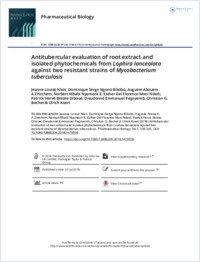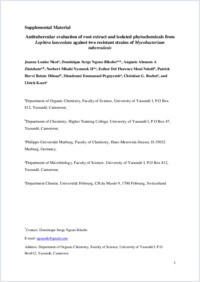Antitubercular evaluation of root extract and isolated phytochemicals from Lophira lanceolata against two resistant strains of Mycobacterium tuberculosis
- Nkot, Jeanne Louise Department of Organic Chemistry, Faculty of Science, University of Yaoundé, Cameroon
- Ngono Bikobo, Dominique Serge Department of Organic Chemistry, Faculty of Science, University of Yaoundé, Cameroon - Department Chemie, Universität Fribourg, Switzerland
- Zintchem, Auguste Abouem A. Department of Organic Chemistry, Faculty of Science, University of Yaoundé, Cameroon - Department of Chemistry, Higher Training College University of Yaoundé, Cameroon
- Mbabi Nyemeck II, Norbert Department of Organic Chemistry, Faculty of Science, University of Yaoundé, Cameroon - Faculty of Chemistry, Philipps-Universität Marburg, Germany
- Moni Ndedi, Esther Del Florence Department of Microbiology, Faculty of Science, University of Yaoundé, Cameroon
- Betote Diboué, Patrick Hervé Department of Microbiology, Faculty of Science, University of Yaoundé, Cameroon
- Pegnyemb, Dieudonné Emmanuel Department of Organic Chemistry, Faculty of Science, University of Yaoundé, Cameroon
- Bochet, Christian G. Department Chemie, Universität Fribourg, Switzerland
- Koert, Ulrich Faculty of Chemistry, Philipps-Universität Marburg, Germany
-
01.01.2018
Published in:
- Pharmaceutical Biology. - 2018, vol. 56, no. 1, p. 318-324
English
Context: The roots of Lophira lanceolata Van Tiegh. Ex Keay (Ochnaceae) have numerous medicinal values in the Central African region. Even though the MeOH extract of the roots has shown antimycobacterial activities, the constituents responsible for this inhibitory activity remain unknown.Objective: Phytochemical investigation of the MeOH root extract of L. lanceolata and determination of the antimycobacterial activities of that extract and constituents against the growth of Mycobacterium tuberculosis.Materials and methods: Column chromatography was used to provide bioactive phytoconstituents. Those compounds were elucidated using MS and NMR spectroscopic data. Antimycobacterial screening of the extract (4.882– 5000 µg/mL in DMSO during 24 h at 37 °C) and isolated compounds (0.244–250 µg/mL in DMSO during 24 h at 37 °C) was performed by microplate alamar blue assay (MABA) against two mycobacterial strains.Results: The investigation of L. lanceolata MeOH roots extract provided of mixture of unseparated biflavonoids with a newly described one, dihydrolophirone A (1a) associated to lophirone A (1b). The bioactive compounds that effectively inhibited the growth of M. tuberculosis AC45 were found to be compounds 1 and 2. They exhibited MIC values of 31.25 and 15.75 µg/mL, respectively, and their MIC was found to be 62.5 µg/mL against resistant strain AC83.Discussion and conclusions: It is clearly evident from the results obtained that the mycobacterial activity of L. lanceolata could be related mainly to its steroid and flavonoid contents. Therefore, this study suggests the potential of the above- mentioned classes of compounds as promising candidate agents for developing new anti-tuberculosis drugs.
- Faculty
- Faculté des sciences et de médecine
- Department
- Département de Chimie
- Language
-
- English
- Classification
- Chemistry
- License
-
License undefined
- Identifiers
-
- RERO DOC 322841
- DOI 10.1080/13880209.2018.1476559
- Persistent URL
- https://folia.unifr.ch/unifr/documents/307095
Other files
Statistics
Document views: 118
File downloads:
- pdf: 143
- Supplementary material: 127

